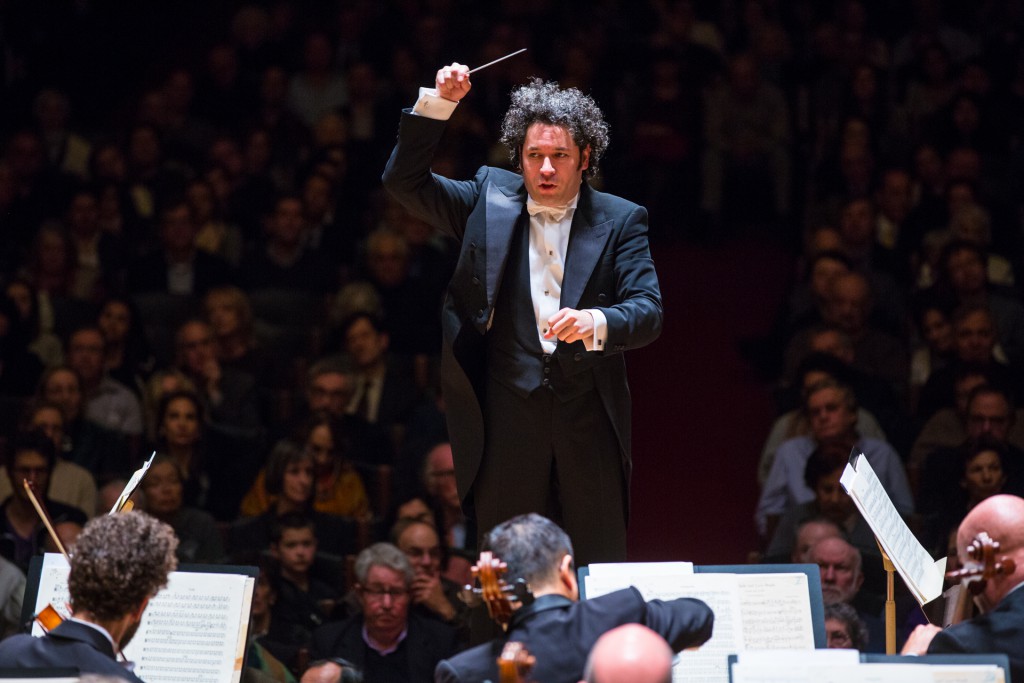Dudamel, LA Phil make a splash with Shostakovich, Salonen and Varèse

Gustavo Dudamel conducted the Los Angeles Philharmonic Wednesday in the Celebrity Series of Boston at Symphony Hall. Photo: Robert Torres
In his ninth year as musical director of the Los Angeles Philharmonic, Gustavo Dudamel is riding the crest of a wave: New music has come to define the venerable orchestra’s programs, and in the latest Celebrity Series concert Wednesday night at Symphony Hall, Bostonians got a taste of the ensemble’s intelligent programming and its conductor’s interpretive zeal.
There is no missing Dudamel’s celebrity. He was a rock star among conductors even before he took the LA Phil baton in 2009 at age 28 as the most acclaimed graduate of El Sistema, his native Venezuela’s state-sponsored music training program. East Coast critics have long chided Dudamel and the LA Phil for extravagance, even flamboyance. Wednesday’s concert had plenty of that, but the program of Salonen, Varèse, and Shostakovich delivered musical rewards well beyond mere showmanship.
The orchestra is strong in every section. Strings play with a delicate gleam. Woodwind figures seem to rise from musical mists. The brasses are warm and round. Yet there was also a depth and dimension to the ensemble’s sound as each work set the air spinning.
In Esa-Pekka Salonen’s Pollux, heard in its East Coast premiere, that sound was felt as well as heard. The 12-minute work — a commission from the LA Phil — takes its cue from a grunge-rock rhythm the composer heard in a Paris restaurant. The rhythm quietly permeates Pollux, humming just below the surface of the glacially shifting musical textures where Salonen’s harmonies evaporate in prismatic vapors.
While not his best orchestral work — Salonen’s driving LA Variations and pulsing Violin Concerto are better examples of his attractive style — Pollux has moments of arresting beauty. It’s clearly a piece that Dudamel believes in, and he drew a shimmering reading from the orchestra to make a strong case for it.
Varèse’s Amériques was the unexpected highlight of Wednesday’s program. The first composition the French composer wrote upon his arrival in the United States, Amériques captures the live-wire intensity of life in the New World. At its height the music snarls, roars, advances, and finally retreats into the abyss.
The work employs a wide array of percussion and other noisemakers, such as sirens and a lion’s roar, whose sounds brought a touch of humor to the performance. Thumping basses near the end of the work bounded with jazzy motion.
Too often, performances and recordings of this prickly score can be episodic, with conductors failing to find a sense of direction in Amériques’ block-like structure. But in Dudamel’s hands, the work spun ever forward with dynamic force. The loud sections, which culminated in pillars of sound, left the ears ringing. The softer passages of the score had a Debussyian gloss as Dudamel mined nuggets of melody.
When a visiting orchestra plays Shostakovich, comparisons with the Boston Symphony Orchestra’s current survey of the composer’s symphonies are inevitable. Andris Nelsons’ version of the Fifth Symphony with the Boston Symphony Orchestra reveled in fine details. Dudamel was more sweeping. His tempos were fleet in the first movement’s pompous march, and the Scherzo — both raspy and sarcastic — swirled. But there were moments where Dudamel lingered: The Largo, with its faint glow, was a scene of Mahlerian beauty.
The finale began at whip crack pace and only quickened. After slowing the tempo for a contemplative middle section, Dudamel drew out the conclusion for a triumphant ending. The encore was an impassioned “Liebestod” from Wagner’s Tristan und Isolde.
The Celebrity Series continues May 2 at Pickman Hall with soprano Julia Bullock performing Schubert, Fauré, Barber and more. celebrityseries.org; 617-482-6661.
Posted in Performances




